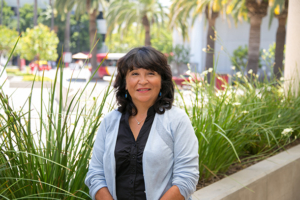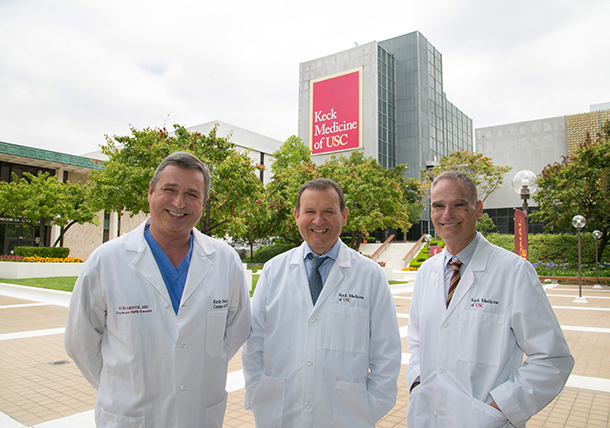In 1996, rather than taking long walks, or watching her kids play sports, Beni Carrillo started spending much of her days sleeping. The exhaustion wasn’t a complete surprise because Carrillo had a liver disease, and her lack of energy was a sign that she needed a transplant.

Beni Carrillo is smiling happily, she’s a liver patient of Rick Selby performed 20 years ago. (Photo/Ricardo Carrasco III)
“I felt lost at the time and didn’t where to go,” Carrillo said. One physician cautioned against having the procedure at Keck Medicine of USC because the program was new and she would be its first liver transplant patient. Preferring not to close any doors, she met Rick Selby, MD, professor of surgery and division chief of hepatobiliary, pancreas, and abdominal organ transplantation, anyway. Ultimately, Carrillo put her faith in USC’s young program.
As USC celebrates the 20th anniversary of the liver transplant program, Carrillo is clocking four miles a day on her feet and has lived to see her kids’ kids play sports. She still sees her surgeon, but now it’s for dinner as friends. Two decades later, the program boasts the best patient survival rate in Southern California and is among the top three in the United States, according to the Scientific Registry of Transplant Recipients. The program also treats the sickest patients with the most complex problems and the lowest probability of survival, making the survival rates even more impressive.
“Our outcomes speak to the quality of the program,” said Yuri Genyk, MD, surgical director of the Liver Transplant Program.
During the past two decades, the Liver Transplant Program at Keck Medicine has pioneered new solutions for patients, including living donor transplants, a procedure in which a healthy person donates a portion of his or her liver to a patient whose liver is failing.
Oscar Rosales is one of those patients who chose a living donor transplant.
He was on the transplant list at an area hospital. But, because his quality of life had become so poor, his brother, Erick, volunteered to donate a portion of his liver and they had the procedure performed at Keck Medicine, which has the only active living donor liver transplant program in Los Angeles County.
Two years later, both brothers are living full, healthy lives.
“Organ transplantation is magical,” Selby said. “Those fortunate recipients realize an energy state that they have not possessed in 20 years. Their recovery is a moving spectacle for all of us who participate in transplantation and further inspires us to expand transplant science and organ availability.”
— Hope Hamashige


